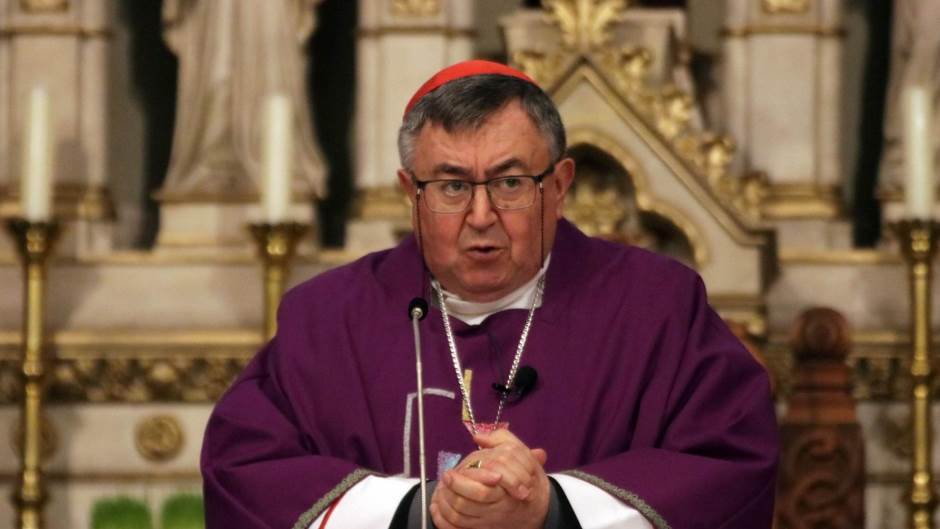
In his response to a query about the planned Holy Mass for the Bleiburg victims, Bosnia’s Archbishop Vinko Puljic told the Ministry of Human Rights and Refugees that his and the life of other Catholics were jeopardized because of the negative atmosphere that was created in the city regarding the Mass.
The announcement that a mass for the victims of the 1945 mass killings near the Austrian town of Bleiburg will be held at Sarajevo's Sacred Heart Cathedral on Saturday prompted public outrage because many see the victims of the massacre as Nazi collaborators who do not deserve to be commemorated.
Being in charge of the implementation of the Law on Freedom of Religion and the Legal Status of Churches and Religious Communities in Bosnia and Herzegovina, the Ministry had asked the Archbishop about the Mass and he replied that his “life and the lives of many Catholics are endangered."
Puljic explained that every year Croat bishops chose someone among them to serve a Mass on behalf of everybody for all war victims, especially those killed in Bleiburg and that after 15 years, it was his turn.
"We are not talking about numbers because it has never been fully investigated how many people were killed there,” Puljic said, adding that the victims were executed without being tried.
He said he accepted the task but the pandemic made travelling impossible and the Mass had to be held in Sarajevo without the presence of many people as per government instructions during the corona crisis.
However, Cardinal Puljic stated in the letter that such a climate of intolerance was created in the city, that his and the lives of so many Catholics are endangered.
"I am sorry that the dead are being used for manipulation for political purposes because celebrating Mass for the dead is our duty and obligation,” Puljic said.
He said the Church wants to distance itself from such a climate and added that he informed the Holy See about what is going on.
Cardinal Puljic expressed hope that the rights and freedoms of the faithful will be protected and that they will not be manipulated for political purposes.
Amid a Yugoslav army offensive aimed at defeating pro-Nazi and anti-communist forces, tens of thousands of mostly pro-fascist Croat soldiers and their families fled in 1945 toward Austria to seek help from the British army, only to be turned back by the Brits right into the hands of anti-fascists.
In and around the Austrian town of Bleiburg, thousands of the so-called Ustashas were killed.
The Yugoslav forces saw the slaughter they committed as punishment for the tens of thousands of Jews, Serbs, Roma and anti-fascists killed by the Nazi-allied Croatian nationalists, called Ustasha, during WWII.
After the dissolution of Yugoslavia, Croatia began commemorating the Bleiburg victims with a large gathering near the Austrian town every year.Croatian nationalists perceive the controversial annual event as a symbol of their suffering under communism.
Austrians, however, see it as a glorification of Nazism and have banned Ustasha flags and insignia at the gathering.
The Catholic Church in Carinthia rejected last year a request from Croatia’s Bishops’ Conference to hold a Mass during the event, labelling it as a promotion of nationalist ideas.
The event in Bleiburg was cancelled this year due to the pandemic and the organisers of the event, the Honorary Bleiburg Platoon, said it will be held in different cities instead, among them in Sarajevo.
Many Sarajevans see the commemoration as an attempt to rehabilitate the Ustasha regime that committed many gruesome crimes in the country.
In an interview with the Croatian Catholic radio, Puljic said he did not expect such reactions to the Mass but that the sermon will send a message that “every evil, every crime is a crime, regardless of who committed it.”
“We can never identify with any crime. We have to distance ourselves. Who does not distance himself, becomes part of the crime,” Puljic said, explaining that these are the principles and that Jesus himself said that “the truth will liberate us.”
“If we want to build reconciliation and peace, we have to have the courage to call everything by its name, we have to be brave enough to accept the truth and build mutual trust among us that way,” the Cardinal said.
Kakvo je tvoje mišljenje o ovome?
Učestvuj u diskusiji ili pročitaj komentare





 Srbija
Srbija
 Hrvatska
Hrvatska
 Slovenija
Slovenija







